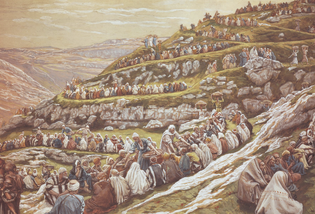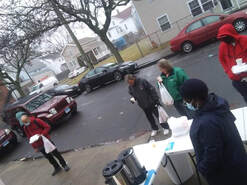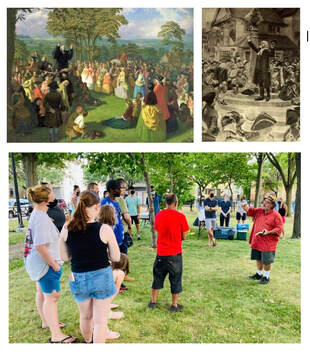 The feeding of the 5000 in Mark 6 is a miracle story that reveals who Jesus is—most assuredly. Yet still, Mark’s purpose in writing a gospel for the church community in Rome to be read out loud at the symposium following their supper gatherings (what we might call a church gathering) was to build the church, mature the congregation’s faith, and teach what it means to follow Jesus and acknowledge him as Lord, raised from the dead. More so, Mark’s Gospel, including this feeding of the multitude story, was (and still is) to prepare the church for the persecution, hardship, and the difficulty of being the church while staying faithful to its mission and Lord. The Mark 6 feeding of the five thousand is as much about who the church is as it is about who Jesus is. While the miracle itself is revealing of who Jesus is and certainly links the reader back to the Old Testament Exodus under Moses (thus, picturing a new exodus under One better than Moses, giving the new mana), this is a discipleship story that has a discipleship point to be made to the readers/listeners. First, three times in the space of five verses the word “desolate” (“desert,” actually, “wilderness” is best) is used in a fourteen-verse story—over a third of this vignette on the feeding the 5000 focuses on where this event takes place. And, if we count the reference to “green grass” (v. 39) where Jesus had the crowd sit to be served, this story does indeed focus the reader/listener’s attention on the place of this story; thus, giving a clue to its importance on the subject of discipleship--what does it mean to follow Jesus? Second, the story is mostly about the newly appointed “apostles,” the twelve “sent ones” (6:7-13), who had just returned (v. 30) from the mission Jesus had sent them. The story begins with their return, reporting, and Jesus taking them to some spot—a “desolate place,” a grassy space of wilderness—to eat and rest. “Leisure” (as in “had no leisure even to eat,” v. 31c) is an unfortunate word choice of the ESV, for it gives the impression of fun, earned vacation or a weekend (perhaps), or an extended break from work—here, it simply means a few moments to rest so the disciples can eat. Then, after finding their own “desolate” place to eat, the crowd from nearby towns followed and found “them” (v. 33)—Jesus and the disciples, who had just been going through their towns preaching the kingdom of God. After Jesus spent some time teaching the crowd, the apostles “kindly” mentioned to Jesus that the crowds, who had followed “them” to their desolate place (v. 33), needed to find their own food in some other place (vv. 35-36). While we often focus on Jesus in this story, Mark keeps the “apostles” front and center. Just after the disciples request the crowd be sent away to buy their own food, Jesus instructs them: “You give them something to eat” (v. 37a)--they were their eating (by-the-way) and obviously had food; something from their own resources. Still complaining, the disciples sarcastically say, “Shall we go and buy two hundred denarii worth of bread and give it to them to eat?” (v. 37b). (The disciples really wanted to get this crowd to go away!) Paying no mind, Jesus asks them to gather what they had left from their food—“Five [loaves], and two fish” (v. 38c). Then, Jesus instructs the 5000 to sit in groups of hundreds and fifties (like Moses did) and after blessing this paltry amount of food for such large a crowd, gives the food to the disciples to set before all the people—in other words, to serve the crowd food in that desolate place they had originally found to “get away and eat themselves.” A quick aside: The miracle in this story is very linked to the disciples, for the multiplying of the bread and fish come, not in some surreal miraculous moment, but through the serving of the bread and fish by the disciples—so even here, the story focuses on the disciples. As you can see, while the feeding miracle stands out (and is, of course, important), but the story has the multiplication of the loaves and fish in the serving by the disciples to the people. The content of this story focuses our attention on the disciples—more so, on a discipleship moment. So what’s happening here? Yes, at the very moment the new exodus is revealed, displayed in the feeding of the 5000, and Jesus is revealed as the ultimate Moses, the disciples first find a spot to eat and are interrupted by the crowd who had followed “them” to this desolate place, and, then, wanted to turn them away when it was time for the crowd to eat. There is some irony here for sure. As I had mentioned before in a previous Facebook post: I believe, the readers on this side of the text are to hear that Jesus is setting his disciples up for a lesson—a learned experience, a discipleship moment—in what it means to be a disciple, a follower of Jesus. We, his church, Jesus’ disciples are how the bread and the fish multiply. This is revealed in the focus on the disciples and the desolate place in this story. Later, after the resurrection and as the church increased, this can be seen in the multiplying of tables (in supper rooms) of gathered believers starting in Jerusalem and spreading all the way to Rome and eventually filling and overtaking an empire. We can see this revealed in the multiple references to supplying the needs of the poor in the New Testament. And, that the original (not so much, sadly, later in church history, even up to now) gathering of strangers and unequals (i.e., gathered churches) provided a platform and venue for the poor’s needs to get met, including a meal. The Lord’s supper was a supper after all. We learn of discipleship here: following Jesus is going to interrupt a disciple’s life. Needs are going to be met out of His disciples resources. Meeting needs in inconvenient space, space we thought was for our leisure, is a sign that the Kingdom of God has come. It is proclaiming Jesus—of course use words. But that’s what the disciples did on their short-term mission just prior to this episode. So, the narrative point (Mark’s narrative point) was to move the disciple’s notion of ministry beyond words to illustrating the arrival of the Kingdom in Jesus. Remember, the miracle of multiplying the food was through the serving of the disciples—just at the time they needed rest and needed some leisure time. Ministry and mission, meeting needs and serving—all should be expected to interrupt and invade our leisure space.
1 Comment
 Rain (which it is doing) doesn't keep folks away from the breakfast; and they waiting around for the service. Rain (which it is doing) doesn't keep folks away from the breakfast; and they waiting around for the service. “But do you think they’d come if you didn’t serve a breakfast or hot dogs?” Probably not, for the most part. Imagine someone walking up to Jesus during the feeding of the five thousand and saying, “They’re only here for the food, you know?” I can imagine Jesus’s reply: “So?” I get this and similar questions and statements all the time about our weekly Saturday sidewalk breakfast and church service and the summer Wednesday evening Park BBQs. Usually, from the well fed and safely sheltered, I might add. And, plus, what’s wrong with doing something that seeks to meet a perceived need, let alone a real life need, and, in this case with us, so also to be able to tell them about their eternal need of forgiveness and that Jesus paid that price for them? Do not think “ordinarily church” (regular Sunday-go-to-a-building church) doesn’t do the same thing . . . most of church programs are to meet perceived needs and attract people or to get them to stay . . . children’s programs and activities appeal to parents perceived needs, family functions appeal to family perceived needs, even friendships appeal to perceived needs . . . almost all church activities include the “don’t forget to invite your . . . [friend, neighbor, co-worker, family]” clause to get the unchurched to, well, go to church through these programs and activities. Most VBSs, Christmas events, even Easter activities are designed to “attract” through something that a person or family perceives as important or needed. This is never questioned. But serve the poor and homeless food and the ordinary-gospel-church folks go crazy. Nevertheless, also, let’s remember there is direct biblical precedence (inference) in joining gospel & food, church & food, even preaching/teaching & food. Food is an element in Jesus’ ministry whether it is around a table or in a field or on a mount. It is a founding element in the young, newly born church well into the first 150 years of early church history, and still hanging on up to 350 AD until Constantine put the church in a box (i.e., a building) and took it out of the home and away from the actual meal (supper) table. We build ordinary on what we have always done and on the cultural, social, and structural habits we are accustomed to (e.g., a 5 day work/weekend–week for example or full time Monday-Friday jobs that give us evenings and weekends off—the young and early church knew of no such privileges). Making what we think is “ordinarily” based on our customs and culture—our own location in time, place, and space, we, then, read back into scripture and then affirm our “ordinarily.” But a non-ordinary people in a non-ordinary place needs non-ordinarily church. The sidewalk church in no way replaces the Sunday gathering. But it is church in a place and space where people will most likely never go to a building-church in a neighborhood outside (in most cases, way outside) their neighborhoods. Two things, outside the “So if they come for only the food” take: First, the homeless, the poor neighbors, those experiencing food scarcity (among all the other experiences of basic needs scarcity) can imagine an outside, year round (even in the rain and cold and snow) church being formed. It is hard for the well-buildinged (I made up a word here)—buildinged church, “an ordinarily church” to imagine such a church forming. Second, while it is still small, average on any given Saturday on the sidewalk is about 10, but some Saturdays upward to 16 to 18 and as many as 20, the weather doesn’t determine the numbers—the attendance—of people who join us for Sidewalk Church. Pouring rain. Zero and single digit cold. Snow, even blizzard. Nor hail. And not even hot and muggy . . . stops folks from coming and joining us. The “ordinarily church” that meets in a building and is mostly accessed by car can’t even imagine such faith. So . . . so what if they only come for the food . . . the breakfast . . . the hot dogs?
 John Wesley's Journal, March 31, 1739: “In the evening I reached Bristol, and met Mr. Whitefield there. I could scarce reconcile myself at first to this strange way of preaching in the fields, of which he set me an example on Sunday; having been all my life (till very lately) so tenacious of every point relating to decency and order, that I should have thought the saving of souls almost a sin, if it had not been done in a church.” Because Anglican Church leadership had forbidden and barred their churches from allowing George Whitefield from preaching in their pulpits, he, then instead, took to the open air to preach. On February 17, 1739, Whitefield preached, for the first time, in the open air to about two hundred coal miners at Kingswood (near Bristol, England). Within three weeks, thousands began crowding to listen to Whitefield’s preaching. Soon, he called on John Wesley to come help him in this open air preaching. Though Paul and other New Testament figures took to the open air with the message of the gospel, Whitefield and Wesley (re)discovered (if you will) in these (as one author put it) “unsettled conditions,” open air preaching among “the neglected Kingswood colliers” (coal miners).
Soon even John Wesley was refused access to Anglican pulpits. Yet, that did not stop Wesley from preaching the gospel: On one occasion, because he was blocked from a pulpit in Epworth, his father buried just outside that church, Wesley famously stood on his father's grave and began to preach. Many came to listen. Whitefield and Wesley reached the “neglected” multitudes among us (which I call the “forgotten elect”*) with their open air preaching. And, none can say these outdoor masses weren’t discipled to mature their faith, for much of our present day discipleship is borrowed and built on Whitefield and Wesley’s “methods.” Now mind you, I am no John Wesley nor George Whitefield, and I haven't been banned from any pulpits (that I know of anyway) and, as far as I can tell, I am in good standing with my denomination, but yet, still, almost everyone who stands in front of me at our Summer "In His Midst" Park BBQs or on the sidewalk each Saturday does not attend church—so, for them it is moot why I preach outdoors, this is the only Gospel, the only church, the only pastoral care, and for some the only discipleship they are going to ever get. They are the neglected among us that regular, ordinary pulpits are not going to reach—by design, default, habit, or ignorance, it matters not. We cannot do ordinary church in a place where there are so many, what I call, the forgotten elect. No matter which theological background you come from, most of these good sinners will never enter a church building until it is too late. So, the Hill is my parish. Yes, there will be distractions and required other duties, but while God gives me breath and enables, I will seek to preach and reach these forgotten elect. *In this way, I am a little more Whitefield than Wesley, I get that. |
AuthorChip M. Anderson, advocate for biblical social action; pastor of an urban church plant in the Hill neighborhood of New Haven, CT; husband, father, author, former Greek & NT professor; and, 19 years involved with social action. Archives
February 2024
Categories
All
|
Pages |
More Pages |
|
 RSS Feed
RSS Feed